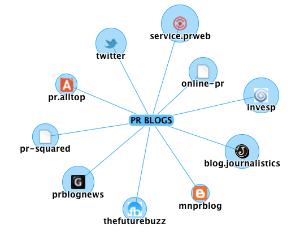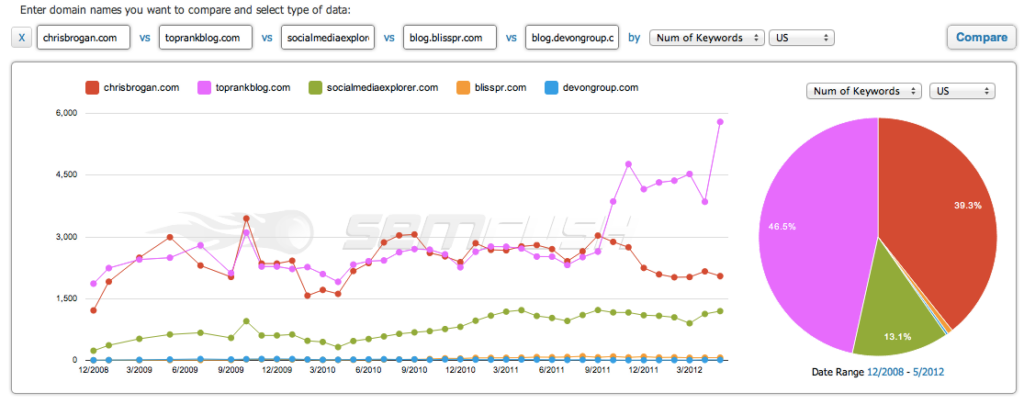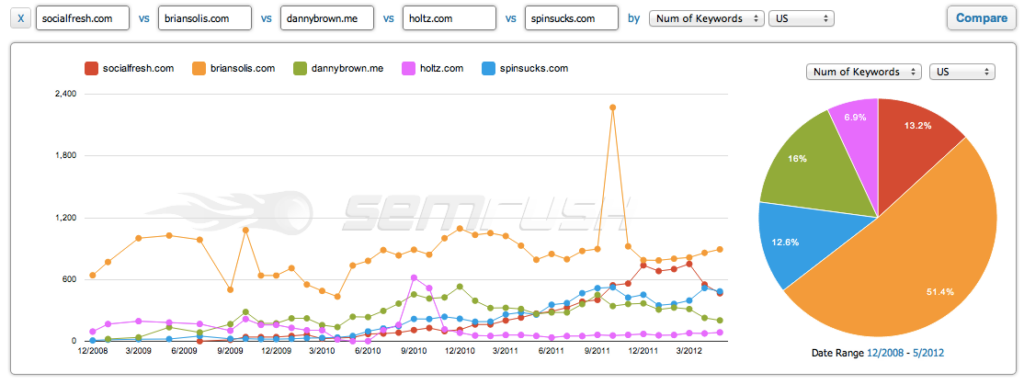 Cision recently published a list of top PR & Marketing blogs which is timely, because having worked in both worlds for 11 years plus, I’ve seen the convergence accelerated by shifts in technology and consumer behaviors. In the list, Cision published an influence score to sort the blogs (TopRank’s Online Marketing Blog is sandwiched at #2 between Chris Brogan and Jason Falls) and it made me wonder about their influence when it comes to search.
Cision recently published a list of top PR & Marketing blogs which is timely, because having worked in both worlds for 11 years plus, I’ve seen the convergence accelerated by shifts in technology and consumer behaviors. In the list, Cision published an influence score to sort the blogs (TopRank’s Online Marketing Blog is sandwiched at #2 between Chris Brogan and Jason Falls) and it made me wonder about their influence when it comes to search.
Most bloggers say they know what SEO is and some even profess to engage in SEO best practices, but I thought it would be interesting to do a simple analysis of the top 10 on the list to see what their referring organic keyword and inbound link profiles looked like. Arguably, if a blog is optimized, it will attract traffic through search with phrases that represent the topics the blogger wants to be known for.
The blogs I looked at include:
- chrisbrogan.com
- toprankblog.com
- socialmediaexplorer.com
- blog.blisspr.com
- blog.devongroup.com
- socialfresh.com
- briansolis.com
- dannybrown.me
- holtz.com/blog/
- spinsucks.com
Both tools I used only allow a comparison of 5 at a time, so I’ll show the keyword traffic and inbound link comparisons for the top 1-5 and then 6-10 based on the Cision list. Unfortunately, the Google keyword tracking tool SEMRush does not handle sub-domains or sub-folders, so I could not report on all blogs from the top 10 list.
Top 10 PR & Marketing blogs – keyword traffic from Google in the U.S.:

According to SEMRush, TopRankBlog.com (Online Marketing Blog) and chrisbrogan.com were neck and neck for quite a while when it comes to keyword diversity in Google search results. Then late last year, things separated a bit. Social Media Explorer looks pretty consistent across the board.
It’s easy to see that over the time span indicated, briansolis.com has had more keyword visibility on Google than the other 4 blogs combined. At the time of the snapshot, he’s still ahead and both spinsucks.com and socialfresh.com are neck and neck.
Top inbound links to the top 10 PR & Marketing Blogs

For the #1-#5 blogs on the list, both chrisbrogan.com and toprankblog.com are attracting a substantial number of links over a long period of time and as with keyword visibility on Google, socialmediaexplorer.com is consistent. This is a cumulative view, so it does not factor lost links or temporary links.

For the #6-10 blogs on Cision’s list, briansolis.com by far and away has attracted the most links over time by a long shot.
Another thing I thought would be interesting to do is take the list of keywords driving traffic to each blog from Google (as reported by SEMRush) and to bring those lists into a word visualization app and see by word size, how each blog looked topically according to search phrases. Since SEMRush doesn’t handle subdomains, I had to skip blog.blisspr.com and blog.devongroup.com but finished out the 5 with Social Fresh and Brian Solis.
Here are the word visualizations of the top keywords driving search traffic (not of the blog content itself) to each PR & Marketing blog from Google:
chrisbrogan.com – 2,049 phrases

Over 2,000 different phrases tracked on SEMRush is pretty good and many of them are about Twitter as reflected in the word cloud. The diversity of phrases that attract traffic to chrisbrogan.com is impressive from phrases like “sock it to me” to single words like, “flaws” or “persistence”. There’s amazing engagement and sharing with this blog, attracting qualitative links. A modest adjustment in keyword tactics could boost search visibility of this blog even further.
toprankblog.com – 5,794 phrases

With just under 5,800 Google search phrases tracked on SEMRush for Online Marketing Blog, there’s a very large long tail as one would expect with a blog that’s about 8 years old. Google Analytics reports that toprankblog.com actually receives about 30,000 Google keyword referrers each month, so what SEMRush reports is just a sample. At the same time, the word cloud is overwhelmed by a small number of words due to the frequency of their use. ie we’re trying very hard to be the best answer for a mix of marketing-related topics and have been sticking to a fairly narrow editorial focus. This blog attracts traffic from keywords that reflect the expertise of the agency. As a result, the blog is very productive at attracting attention from the media and from those who want to work with our agency.
socialmediaexplorer.com – 1,197 phrases
Google associates socialmediaexplorer.com with Tumblr (and social media) to a great degree. Like our blog, sociamediaexplorer.com has a diversity of referring search phrases, but there is a very significant and specific association with a handful of phrases. My favorite top phrase: “how to piss people off”
socialfresh.com – 466 phrases
The number of phrases SEMRush is tracking for socialfresh.com seems low but there’s more than enough to create a good word cloud. There are quite a few references to Facebook in numerous variations – so it overwhelms the word cloud. There are also many variations of other topics, none of which stands out in particular – long tail. Curiously, Google really likes socialfresh.com for this interesting keyword cluster: “newt gingrich wiki, newt gingrich wikipedia, wikipedia newt gingrich, wiki newt gingrich”
briansolis.com – 893 phrases
I’ll be honest, I was really surprised that SEMRush is only tracking 893 referring Google search phrases for briansolis.com. It’s a very credible, longstanding blog with a lot of rich content. Many of the most popular phrases are social media oriented as you would expect and a good number that are variations of Brian’s own name. There are also a number of popular acronyms: SMO, PR, PR2 which is not easy (from an SEO standpoint). Some fun referring phrases include “please tell me why” and “whoops”.
What’s the takeaway? For any website or blog that expects to be easily found in a relevant way through search, then it’s worth tracking how search engines are treating your blog in search results. Besides the growing importance of social shares and the ever-important technical aspects of indexing and crawling, the two most basic things to consider are:
- Topic to search phrase congruence
- Topic to link phrase congruence
In other words, do people and the web at large see your blog congruent to the way that you are promoting it? Web analytics is probably the most powerful source of data to answer this question but of course I do not have access to web analytics for any website other than my own. For simple competitive analysis, SEMRush and Majestic SEO work quite well.
How do you make sure the content topics you’re targeting with your blog are how people, social networks and search engines are actually seeing it? How are you taking full advantage of all the searching going on (11billion queries a month on Google alone) for topics you’re writing about?
Corporate blogs who cannot allocate as much time and talent as many of the bloggers on the Cision list should pay even more attention to the value of search for reaching their communities and expanding reach online.






